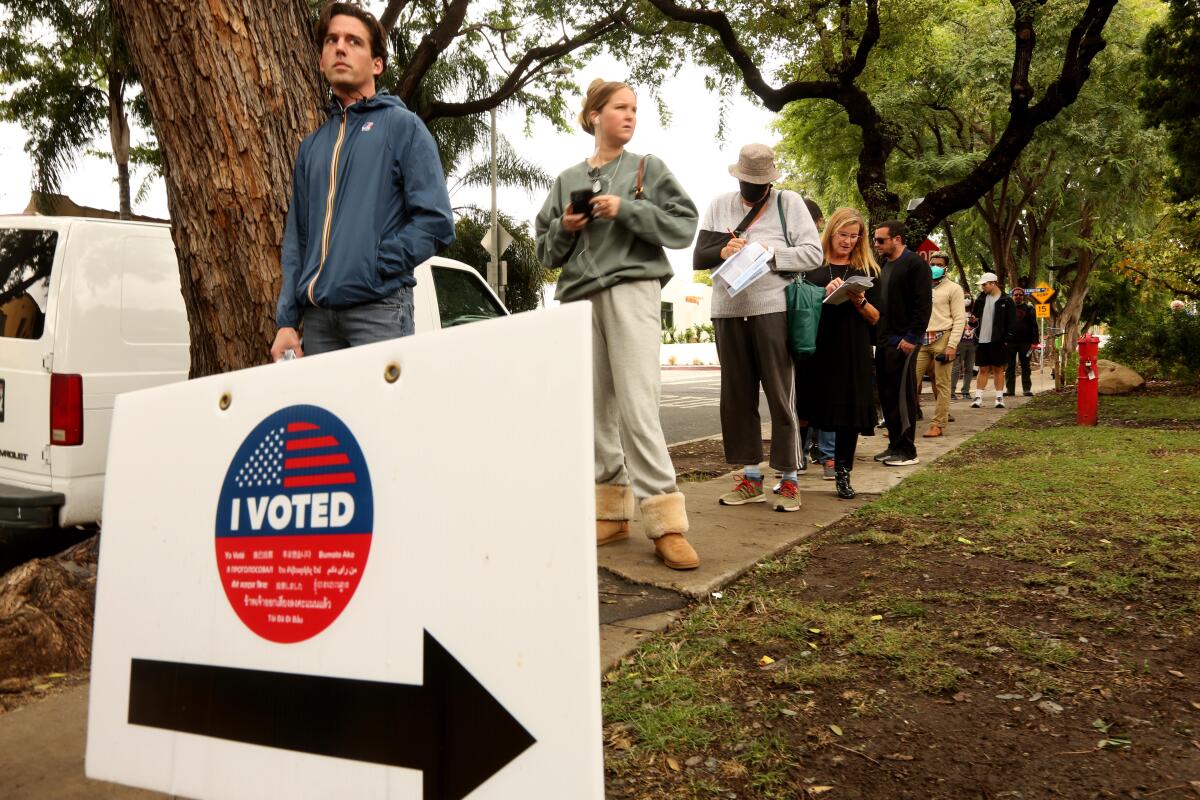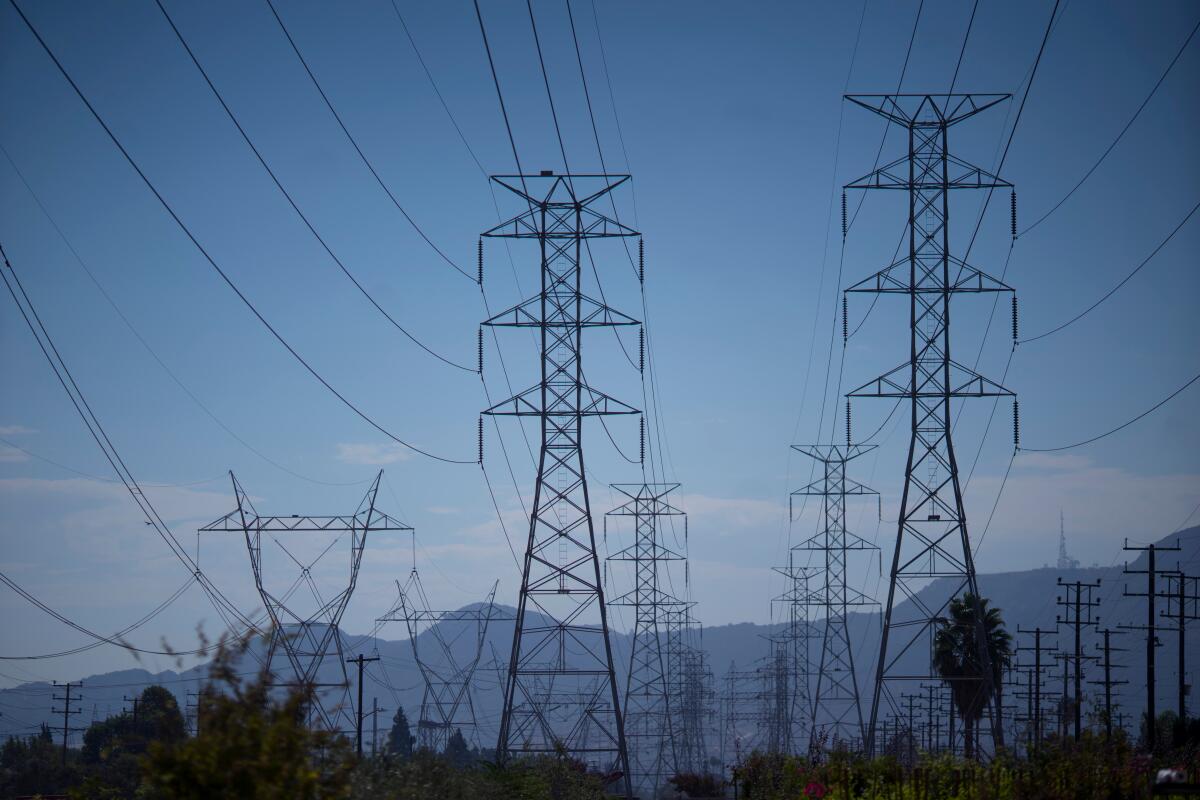Election day has arrived. Here are a few key races to follow

Good morning. Here’s what you need to know to start your day.
- What to know on election day.
- Dangerous winds pummel California. Could power shutoffs affect voting across the state?
- 16 spots where L.A. voters can stress eat, drink and get freebies on election day.
- And here’s today’s e-newspaper
Sign up for Essential California
The most important California stories and recommendations in your inbox every morning.
You may occasionally receive promotional content from the Los Angeles Times.
From voting lines to counting ballots: Democracy requires patience
Happy election day!
Vote centers are opening across the state Tuesday as Californians take part in our ongoing democratic experiment.
By now many of you may have voted. But if you haven’t, here are a few key state and local races and what to know about them as you cram before California’s polls close at 8 p.m.
(And a reminder: As long as you are in line at a voting center before that 8 p.m. cutoff, you are allowed to vote.)

Statewide, voters will make key decisions on housing, homelessness, climate change and more.
In Los Angeles County, Measure A would enact a half-percent sales tax to fund homeless services, doubling and replacing the current quarter-percent sales tax in place through Measure H.
Half of those surveyed said they would vote for Measure A, or already had done so, in the poll taken by the UC Berkeley Institute of Governmental Studies and co-sponsored by The Times.
At the state level, Proposition 5 aims to make it easier to approve government funds for housing and public infrastructure by lowering the support threshold from a two-thirds vote to 55%.
Proposition 33 seeks to expand rent control by repealing the Costa-Hawkins Rental Housing Act of 1995. That would allow local municipalities to establish their own rules regulating rent increases.
Opponents say the new rules would worsen the crisis because developers will build fewer homes. Supporters contend keeping rents affordable protects the most vulnerable people from becoming homeless.
Californians could vote to invest more taxpayer money into climate resiliency with Proposition 4. The proposal calls for billions of dollars to fund water projects, extreme heat and wildfire protection efforts, and ways to mitigate sea level rise and air pollution.
Environmental groups, labor unions, social justice organizations, water agencies, renewable energy companies and the water recycling industry support Proposition 4. Its key opponent is the Howard Jarvis Taxpayers Assn.
There’s also a pair of referendums on a contentious criminal justice experiment.
L.A. County voters have a choice in the district attorney’s race: Continue along the “new path” forged by progressive incumbent George Gascón or return to prosecuting to “the full extent of the law” under his conservative opponent, Nathan Hochman.
Gascón, a Democrat, was elected district attorney in 2020, fueled in large part by the massive social reckoning over institutional racism and criminal justice reform in the wake of the police murder of George Floyd. He vowed to “break the multigenerational cycles of violence, trauma and arrest and recidivism that has led America to incarcerate more people than any other nation.”

Hochman, an independent who previously ran for state office as a Republican, accuses his opponent of enacting “extreme pro-criminal, anti-victim policies” that have made the county’s residents less safe. He has served as president of the L.A. Ethics Commission and says he will take a “hard middle” approach to prosecute people “to the full extent of the law” and restore sentencing enhancements.
A poll of likely voters conducted in late October by the UC Berkeley Institute of Governmental Studies (co-sponsored by The Times) found Hochman leads Gascón by 25 points.
In addition to choosing their next district attorney, county voters also will decide whether certain drug and theft offenses should come with stronger punishments.
Proposition 36 would impose stricter sentences for repetitive theft and offenses involving fentanyl. Supporters say the tougher penalties are needed to curb theft and the rising use of fentanyl. Opponents say it will increase the state’s prison population and associated costs.
A recent poll from the UC Berkeley Institute of Governmental Studies, co-sponsored by The Times, shows 60% of voters are in favor of Proposition 36.
Local voters could reshape L.A. city and county government.
At the city level, Charter Amendment DD has the potential to transform political powerhere for decades to come.
“The once-a-decade drawing of new boundaries for the City Council’s 15 districts has resulted in power plays, self-dealing and even some score-settling at City Hall,” Times reporter David Zahniser wrote in a guide last month. “That’s because the redistricting process has been largely overseen by the very people who stood to benefit from it: the council members themselves.”
The amendment would remove redistricting from those politicians’ purview and rely on an independent panel of citizen volunteers to redraw the map based on U.S. census data. Proponents say the new system is needed as a check on corruption in City Hall.
L.A. County voters also will have the power to potentially reshape the government of the most populous county in the nation.
If approved, Measure G would eventually increase the county Board of Supervisors seats to nine from its current five.
“Currently, each county supervisor represents about 2 million residents,” Times reporter Rebecca Ellis wrote in her voter guide. “That’s roughly the population of New Mexico.”
But there’s more to the measure. It also would add a new county executive position, to be elected by voters. And it would create an independent ethics commission to root out corruption in county government.
But the changes wouldn’t be immediate, as Rebecca noted:
“The deadline to create the ethics commission would be 2026. The county executive would be elected by 2028. And the county wouldn’t see all nine supervisors until 2032, after a redistricting process.”
Just like 2020, waiting for final results will likely be a painstaking act of patience.
“Americans should plan on going to bed Tuesday night without knowing who won the White House,” my colleague Seema Mehta explained this week.
That’s because California and many other states now send millions of mail ballots, which slow the vote counting process. That can lead to a candidate who’s ahead in early returns from mostly in-person voters to fall behind as more mail-in ballots are verified and tallied.

And although California is almost certainly to go blue and give Vice President Kamala Harris its 54 electoral votes, the Golden State is a battleground that could decide control of the U.S. House of Representatives, thanks to some key races in Southern and Central California.
Below are a few more election guides, resources and perspectives from our editorial board you can read or share with day-of voters. Happy voting!
- Voting for state judges can feel like a ‘guessing game.’ Start here
- ‘The primary was the election.’ California’s sleepy Senate race is almost over
- How does the electoral college work?
- Times Editorial Board: Election results may take time. That’s a fact, not grounds for conspiracy theories
- Harris leads by a wide margin among Latinos, signaling a rebound in support for Democrats, poll shows
- How will Asians vote in Orange County? These ‘ballot parties’ might offer clues
- Close polls, likely legal challenges: How TV networks will handle another election week
Today’s top stories
Dangerous winds pummel California. Could power shutoffs affect voting across California?
- Some polling locations could be affected by power shutoffs because of high winds that might increase wildfire activity. But the state’s largest utility companies say voting should not be interrupted.
- More than 170,000 customers across California could see power shutoffs this week, as offshore wind events have prompted widespread red flag and fire weather warnings.
The state sued a Southern California city that banned new homeless shelters
- The lawsuit alleges the city of Norwalk violated anti-discrimination, fair housing and other laws by banning new shelters and homeless housing.
- Norwalk’s City Council in August passed a law banning the facilities along with new laundromats, liquor stores and payday lenders until at least next summer.
- As communities throughout California struggle to address homelessness, Redondo Beach has brought its homeless numbers to “functionally zero.”
Microdosing Ozempic? Some people are playing doctor with weight-loss drugs
- Some patients are using lower-than-recommended dosages of generic weight-loss drugs to slim down while saving money. And despite the disapproval of pharmaceutical companies, doctors and plastic surgeons are experimenting with these treatments.
- The news comes as cheaper, less regulated alternatives to Ozempic have flooded the weight-loss market.
What else is going on
- The 16-month Vincent Thomas Bridge closure stirs the fear of traffic nightmares for nearby neighborhoods.
- Nearly half of all “mansion tax” sales in L.A. have come from Westside neighborhoods.
- A former firefighter sued L.A. County over a colleague’s alleged homophobic behavior.
- A woman who was allegedly kidnapped by her ex-boyfriend was rescued after a friend tracked her via the Find My iPhone app.
- Child care centers across Los Angeles are offering free child care on election day to give parents a chance to vote.
Get unlimited access to the Los Angeles Times. Subscribe here.
Commentary and opinions
- This wretched campaign is over, columnists Mark Z. Barabak and Anita Chabria write. Now what?
- The case against Donald Trump is clear, columnist Doyle McManus argues. Here’s the case for Kamala Harris.
- GOP conservative Scott Jennings explains why he’s voting for Trump even after he nearly “upchucked a time or two on this crazy ride.”
- America has dwelled on division for far too long, columnist LZ Granderson writes. The way forward is together.
- Avoid the “chartthrobs” at CNN and MSNBC this election, urges Matt Brennan, deputy editor for entertainment and arts.
This morning’s must read
Struggling to find the perfect gift for someone who seems to have everything? The Times’ holiday gift guide includes highly curated ideas for Angelenos with specific identities: L.A. devotees, hikers and walkers, gardeners, food lovers, book fans, those wanting special self-care experiences and more.
How can we make this newsletter more useful? Send comments to [email protected].
For your downtime

Going out
- 🍽️ Election day specials and freebies can be found at several restaurants and bars in L.A.
- 🥧 Here are 13 things to be excited about at the new Helms Bakery in Culver City, including pies, doughnuts and all the breads.
- 🚃 A bare-bones production of “A Streetcar Named Desire” invites a reconsideration of the Tennessee Williams classic, our critic writes.
Staying in
- 📺 Here are eight recent politics-free TV shows and specials our critics recommend if you’re having election day anxiety.
- 🥣 Here’s a recipe for apple cinnamon oatmeal.
- ✏️ Get our free daily crossword puzzle, sudoku, word search and arcade games.
A question for you: What’s your favorite political drama or comedy?
Pamela Marsden writes: “Although many series are interesting and quite good entertainment, ‘West Wing’ is still, by far, my favorite political series. It showed me a government that cared about people. It was complicated, grappled with what felt like real-life scenarios, and struggled for answers. It was compelling storytelling and gave me hope.”
Feel free to email us at [email protected], and your response might be included in the newsletter this week.
And finally ... your photo of the day
Today’s photo is from staff photographer Genaro Molina of an Olympic pool-sized ball pit at L.A.’s new Balloon Museum, which features installations from 21 artists with avant-garde interpretations of inflatable and balloon art.
Show us your favorite place in California! Send us photos you have taken of spots in California that are special — natural or human-made — and tell us why they’re important to you.
Have a great day, from the Essential California team
Ryan Fonseca, reporter
Defne Karabatur, fellow
Andrew Campa, Sunday reporter
Hunter Clauss, multiplatform editor
Christian Orozco, assistant editor
Stephanie Chavez, deputy metro editor
Karim Doumar, head of newsletters
Check our top stories, topics and the latest articles on latimes.com.
A photo caption in Monday’s newsletter stated that Megan Baca is the interim director of California Western School of Law’s California Innocence Project. Baca is now an adjunct professor at the law school.
Sign up for Essential California
The most important California stories and recommendations in your inbox every morning.
You may occasionally receive promotional content from the Los Angeles Times.







